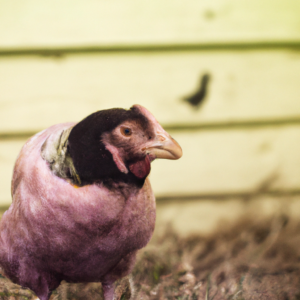
Chickens are lovely and friendly creatures, but unfortunately, they often become targets for predators such as foxes and raccoons. As a chicken owner, it’s crucial to understand the importance of protecting your feathery friends from these cunning foes. In this article, we will explore some effective strategies and measures that you can implement to safeguard your chickens and ensure their safety and well-being. From fortified coops to predator deterrents, we’ve got you covered with practical tips and advice to keep your precious chickens out of harm’s way. So, let’s dive right in and discover how you can create a predator-proof environment for your beloved flock.

Secure the Coop
Choose a secure location for the coop
When selecting a location for your chicken coop, it’s crucial to choose a spot that provides adequate security for your flock. Look for an area that is not easily accessible to predators, such as foxes and raccoons. Avoid placing the coop near dense vegetation or areas with easy hiding spots for potential intruders. Ideally, the coop should be situated in a well-lit area with good visibility.
Use sturdy and predator-proof materials
Building your coop with sturdy and predator-proof materials is vital in ensuring the safety of your chickens. Choose materials like high-quality wood or metal that can withstand attempts by predators to break in. Reinforce vulnerable areas, such as windows and doors, with hardware cloth or wire mesh to prevent any unwanted intrusions.
Install a strong and reliable door
A strong and reliable door is an essential component of a secure chicken coop. Ensure that the door is made from durable materials and securely fastened to the coop. Install a locking mechanism that is difficult for predators to manipulate. Consider using a predator-proof latch that can withstand the force of a determined predator, such as a raccoon.
Cover windows and vents with secure hardware cloth
Windows and vents are potential entry points for predators. To prevent them from gaining access to your chickens, cover these openings with a secure hardware cloth. Make sure the mesh is fine enough to prevent predators from squeezing through. This will allow for proper ventilation while keeping unwanted visitors at bay.
Fortify the Perimeter
Install a sturdy fence
One of the most effective ways to protect your chickens is by installing a sturdy fence around the coop and outdoor enclosure. Choose a fence material that is difficult for predators to climb or dig under, such as welded wire mesh or chain link fencing. Make sure the fence is at least 6 feet high to deter predators like raccoons and foxes.
Bury hardware cloth or wire mesh around the coop
In addition to a fence, consider burying hardware cloth or wire mesh along the perimeter of the coop. Bury it at least 1 to 2 feet deep to prevent predators from digging their way into the coop. This will act as an extra barrier, making it more challenging for predators to reach your chickens.
Consider electric fencing
Electric fencing can be an effective deterrent against predators like raccoons and foxes. The mild electric shock will discourage them from attempting to breach the fence. Ensure that the electric fencing is properly installed and regularly maintained to guarantee its effectiveness. Safety should always be a priority, so follow the manufacturer’s instructions and use caution when dealing with electric fencing.
Remove hiding spots and potential access points
Inspect the area surrounding your chicken coop and remove any potential hiding spots or access points for predators. Trim back dense vegetation that could provide cover for predators. Seal off any gaps or openings in nearby structures that may allow predators to gain access to the coop. By eliminating these opportunities, you can minimize the likelihood of predators targeting your chickens.

Provide Adequate Lighting
Install motion-activated lights
Motion-activated lights can serve as a deterrent to nocturnal predators, such as raccoons and foxes. Install these lights around the perimeter of the coop and in areas where predators may try to approach. When the motion sensor detects movement, the lights will illuminate, startling and potentially scaring away potential threats.
Use solar-powered lights
Solar-powered lights are an eco-friendly and cost-effective option for illuminating your chicken coop and surrounding areas. These lights rely on solar energy to charge during the day and automatically illuminate at night. By providing ample lighting, you can create a less appealing environment for predators and increase the safety of your flock.
Illuminate surrounding areas
In addition to lighting up the immediate vicinity of the coop, consider illuminating the surrounding areas as well. Well-lit spaces can deter predators and make it easier for you to spot any potential threats. By providing adequate lighting, you can enhance the security measures implemented to safeguard your chickens.
Use Alarms and Deterrents
Install motion-activated alarms
Motion-activated alarms can be an effective tool in deterring predators from getting near your chicken coop. These alarms emit a loud sound when triggered by movement, startling and scaring away potential threats. Install them strategically around the coop perimeter, particularly in vulnerable areas where predators may attempt to gain access.
Use predator deterrents such as noise makers or reflective devices
Predator deterrents can play a crucial role in protecting your chickens. Noise makers, such as wind chimes or bells, can startle and discourage predators from approaching. Reflective devices, such as CDs or mirrors, can create an optical illusion that frightens off predators. Position these deterrents near the coop to create a less inviting environment for predators.
Utilize guard animals like dogs or geese
Guard animals, such as dogs or geese, can provide an additional layer of security for your flock. Well-trained dogs can help deter predators and alert you to any potential threats. Geese, known for their territorial nature and loud honking, can act as effective deterrents against intruders. Their presence can discourage predators from approaching the coop.

Implement Predator-Proof Landscaping
Trim back vegetation near the coop
Overgrown vegetation near the coop can provide hiding spots and cover for predators. Regularly trim back any vegetation that is in close proximity to the coop. By maintaining a clear and visible area, you can reduce the likelihood of predators attempting to access your chickens undetected.
Remove fallen fruit or food sources
Fallen fruit or unsecured food sources can attract predators to your chicken coop. Routinely remove any fallen fruit, as it can lure animals like raccoons and foxes. Ensure that your chickens’ food is properly stored and secured in a manner that does not entice predators.
Plant prickly bushes or thorny hedges
Consider planting prickly bushes or thorny hedges around the perimeter of the coop as an additional deterrent for predators. These types of plants can create a physical barrier that discourages predators from approaching the coop. Choose species that are suitable for your climate and maintain them properly to maximize their effectiveness.
Use predator-deterring odors or repellents
Predator-deterring odors or repellents can help keep predators at bay. Sprinkle predator scent sprays around the coop perimeter or use predator urine to create the illusion of a dangerous predator presence. Additionally, some commercial repellents are formulated to deter raccoons, foxes, and other potential threats. Follow the instructions carefully to ensure safe and effective use of these products.
Practice Good Husbandry
Lock chickens in their coop at night
Locking your chickens in their coop at night is a fundamental practice in protecting them from predators. Ensure that the coop door is securely closed before dusk to prevent predators from gaining access during the night. Regularly check and reinforce the coop’s integrity to ensure it remains secure.
Regularly inspect and repair fencing and coop
Maintaining the integrity of your fencing and coop is essential in keeping predators out. Regularly inspect these structures for any signs of damage or potential weak points. Repair or reinforce the fencing and coop as needed to ensure their effectiveness in deterring predators.
Avoid leaving food or treats outside overnight
Leaving food or treats outside overnight can attract not only your chickens but also predators. Always remove any leftover food or treats from your chickens’ feeding areas before nightfall. Properly secure any food storage containers to prevent access by raccoons or other animals.
Keep the coop clean and free of debris
A clean and debris-free coop is vital for your chickens’ safety. Regularly remove any clutter, such as fallen feathers or eggshells, that could attract predators. Maintain good hygiene practices and dispose of waste promptly to minimize potential odors that could lure predators to the coop.

Install Security Cameras
Set up surveillance cameras near the coop
Installing security cameras near your chicken coop can provide additional peace of mind. Position the cameras strategically to cover all potential entry points, including doors, windows, and the surrounding area. Place them at a height that is difficult for potential intruders to tamper with.
Monitor live video feed or use motion detection recording
Monitor the live video feed from your security cameras or use motion detection recording to keep an eye on your chicken coop. This allows you to quickly identify any potential threats or suspicious activity. Regularly review the footage to ensure the security measures you have in place are effective and make any necessary adjustments.
Position cameras to cover all potential entry points
To effectively monitor the security of your chicken coop, position the cameras to cover all potential entry points. This includes not only the coop itself but also the surrounding area. By capturing footage of any unauthorized access attempts, you can take appropriate action and further secure your coop.
Employ Traps and Repellents
Set up live traps for relocation
If you find that predators are becoming a persistent threat to your chickens, consider setting up live traps for relocation purposes. Live traps allow you to capture and safely remove predators from your property without causing harm to them or your chickens. Research local regulations and guidelines regarding the proper relocation of captured animals to ensure compliance.
Use humane repellents like predator scent sprays or predator urine
Humane repellents can help deter predators from targeting your chickens. Predator scent sprays or predator urine create the illusion of a dangerous predator presence, which can discourage potential threats from approaching. Apply these repellents around the perimeter of the coop or in areas frequented by predators.
Consider non-lethal trapping alternatives
Non-lethal trapping alternatives can be effective in controlling predator populations without resorting to lethal methods. Research and consider alternative trapping techniques, such as catch-and-release traps or exclusion devices. These approaches allow for the safe removal of predators from your property while minimizing harm to them and providing continued protection for your chickens.
Educate and Involve the Community
Inform neighbors about the issue
Keeping your neighbors informed about the predator threat to your chickens can help foster cooperation and community support. Inform them about the steps you are taking to protect your flock and encourage them to report any suspicious or concerning activity they may observe. Creating awareness within the community can lead to a collective effort in preventing predator attacks.
Organize a neighborhood watch program
Consider organizing a neighborhood watch program specifically focused on protecting livestock, including chickens. Collaborate with your neighbors to establish a system of surveillance and communication to monitor and address predator threats effectively. Regularly share information and coordinate efforts to promote a safer environment for everyone’s animals.
Share knowledge and tips
Sharing your knowledge and tips on predator control with fellow chicken keepers and members of your community can be mutually beneficial. Organize workshops or online forums where you can educate others about effective strategies for protecting chickens from predators. By sharing your experiences and expertise, you empower others to implement preventative measures.
Collaborate on predator control strategies
Collaborating with your community on predator control strategies can yield more effective results. Consider working together to implement collective measures, such as regular patrols, shared resources, or joint trapping efforts. By pooling resources and knowledge, you can create a stronger defense against predators and increase the safety of all your chickens.
Consider Coop Design Features
Include an enclosed run or outdoor enclosure with secure fencing
Including an enclosed run or outdoor enclosure with secure fencing provides an added layer of security for your chickens. This allows them to safely access outdoor areas while preventing potential predators from reaching them. Ensure that the fencing used is at least 6 feet high and properly secured to discourage climbing or digging under by predators.
Add a predator-resistant flooring such as concrete or hardware cloth
Choosing a predator-resistant flooring for your coop can further enhance its security. Consider options like concrete or hardware cloth, which are difficult for predators to dig through. These materials provide a barrier against potential intruders that may attempt to gain access by burrowing into the coop.
Install roosts and nest boxes that are raised off the ground
Installing roosts and nest boxes that are raised off the ground can help prevent predators from reaching your chickens while they are resting or laying eggs. Position these elevated structures at a height that is too high for predators to jump or climb onto. This ensures that your chickens have a secure place where they can safely roost and lay their eggs.
Design a coop with double doors or a vestibule
Consider designing your coop with double doors or a vestibule as an additional security measure. This design feature creates an airlock-like entry system, making it more difficult for predators to gain immediate access to your chickens. The extra barrier provides extra time for you to respond and prevents predators from easily infiltrating the coop.
In conclusion, protecting your chickens from predators like foxes and raccoons requires a multifaceted approach. By implementing measures such as securing the coop, fortifying the perimeter, providing adequate lighting, using alarms and deterrents, implementing predator-proof landscaping, practicing good husbandry, installing security cameras, employing traps and repellents, educating and involving the community, and considering coop design features, you can significantly increase the safety of your flock. Remember to regularly assess the effectiveness of your security measures and make any necessary adjustments to ensure the ongoing protection of your chickens. With these comprehensive strategies in place, you can enjoy the peace of mind knowing that your feathered friends are well-secured and protected from potential predators.







